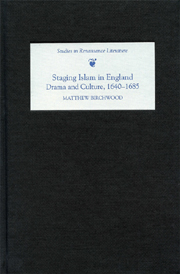Book contents
- Frontmatter
- Contents
- List of illustrations
- Acknowledgements
- Introduction
- 1 Cultural Encounters between England and Islam in the Seventeenth Century: A Topography
- 2 Framing ‘an English Alchoran’: The Famous Tragedie of Charles I and the first English translation of the Qur'an
- 3 Orienting the Monarch: Tyranny and Tragedy in Robert Baron's Mirza and John Denham's The Sophy
- 4 Turning to the Turk: Collaboration and Conversion in William Davenant's The Siege of Rhodes
- 5 Toleration, Trade and English Mahometanism in the Aftermath of Restoration
- 6 Plotting the Succession: Exclusion, Oates and the News from Vienna
- Conclusion: ‘If we our selves, would from our selves exam'ne us’
- Bibliography
- Index
- Studies in Renaissance Literature
Conclusion: ‘If we our selves, would from our selves exam'ne us’
Published online by Cambridge University Press: 12 September 2012
- Frontmatter
- Contents
- List of illustrations
- Acknowledgements
- Introduction
- 1 Cultural Encounters between England and Islam in the Seventeenth Century: A Topography
- 2 Framing ‘an English Alchoran’: The Famous Tragedie of Charles I and the first English translation of the Qur'an
- 3 Orienting the Monarch: Tyranny and Tragedy in Robert Baron's Mirza and John Denham's The Sophy
- 4 Turning to the Turk: Collaboration and Conversion in William Davenant's The Siege of Rhodes
- 5 Toleration, Trade and English Mahometanism in the Aftermath of Restoration
- 6 Plotting the Succession: Exclusion, Oates and the News from Vienna
- Conclusion: ‘If we our selves, would from our selves exam'ne us’
- Bibliography
- Index
- Studies in Renaissance Literature
Summary
Worlds of examples, I could here denote
As well in ancient dayes, as moderne times:
What were these Pagans past? what were they not?
What are our present judgements? for like crymes?
may not their Alcoran, serve to condemn us?
If we our selves, would from our selves exam'ne us.
William Lithgow, The Gushing Tears of Godly Sorrow, 1640Appearing in 1640 and riven with unanswered questions, Lithgow's poem expressed the endemic spiritual and moral uncertainty that troubled many private consciences in that decade and would dramatically shape public life for the remainder of the century. In the same year as the poem, Charles' abortive attempts to impose a religious settlement on the Scottish Church through military force had fatally exposed the breach between the English king and his Parliament, stretching bonds of loyalty and tradition beyond breaking point. The war and revolution that followed irrevocably altered the face of the nation, transforming not only its social, political and religious institutions but perhaps most fundamentally shifting the very terms by which the nation imagined itself. What we now think of as the ‘literary’ expression of the period – particularly drama for the purposes of this study– was inevitably caught up in this process, along with the outpourings of treatises, newsbooks and printed polemic most commonly thought of as ‘political’. As this book has sought to demonstrate and as Lithgow's poem synecdochally epitomises, Islam was an ever-present touchstone for a whole range of writers struggling to find meaning in the chaos, or determined to impose a meaning of their own.
- Type
- Chapter
- Information
- Staging Islam in EnglandDrama and Culture, 1640–1685, pp. 182 - 186Publisher: Boydell & BrewerPrint publication year: 2007



